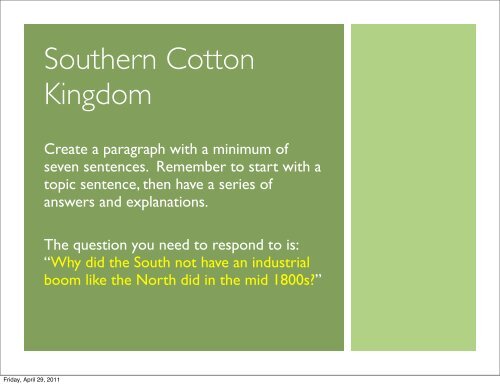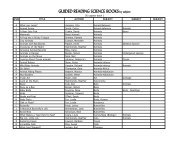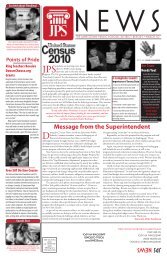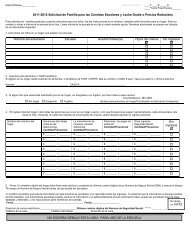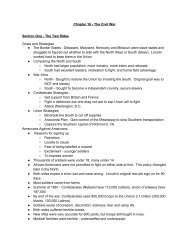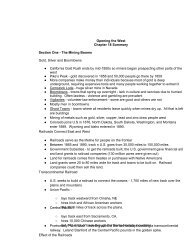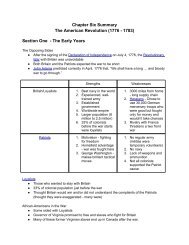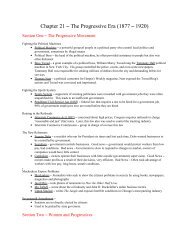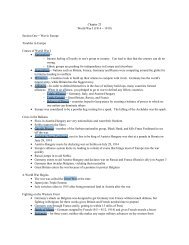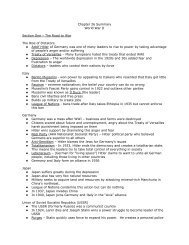Southern Cotton Kingdom.pdf - Jamestown Public Schools
Southern Cotton Kingdom.pdf - Jamestown Public Schools
Southern Cotton Kingdom.pdf - Jamestown Public Schools
You also want an ePaper? Increase the reach of your titles
YUMPU automatically turns print PDFs into web optimized ePapers that Google loves.
<strong>Southern</strong> <strong>Cotton</strong><br />
<strong>Kingdom</strong><br />
Create a paragraph with a minimum of<br />
seven sentences. Remember to start with a<br />
topic sentence, then have a series of<br />
answers and explanations.<br />
The question you need to respond to is:<br />
“Why did the South not have an industrial<br />
boom like the North did in the mid 1800s?”<br />
Friday, April 29, 2011
Friday, April 29, 2011<br />
Rise of the <strong>Cotton</strong><br />
<strong>Kingdom</strong>
Rise of the <strong>Cotton</strong><br />
<strong>Kingdom</strong><br />
<strong>Cotton</strong> Gin Changes Everything<br />
Friday, April 29, 2011
Rise of the <strong>Cotton</strong><br />
<strong>Kingdom</strong><br />
<strong>Cotton</strong> Gin Changes Everything<br />
Eli Whitney’s invention allows for quick removal<br />
of seeds and make cotton VERY profitable<br />
Friday, April 29, 2011
Rise of the <strong>Cotton</strong><br />
<strong>Kingdom</strong><br />
<strong>Cotton</strong> Gin Changes Everything<br />
Eli Whitney’s invention allows for quick removal<br />
of seeds and make cotton VERY profitable<br />
Agriculture Based<br />
Friday, April 29, 2011
Rise of the <strong>Cotton</strong><br />
<strong>Kingdom</strong><br />
<strong>Cotton</strong> Gin Changes Everything<br />
Eli Whitney’s invention allows for quick removal<br />
of seeds and make cotton VERY profitable<br />
Agriculture Based<br />
South can focus on cotton production year round<br />
whereas the North cannot due to climate<br />
Friday, April 29, 2011
Friday, April 29, 2011<br />
<strong>Cotton</strong> Gin
Effects of the <strong>Cotton</strong> Gin<br />
Using the <strong>Cotton</strong> Gin<br />
Friday, April 29, 2011
Effects of the <strong>Cotton</strong> Gin<br />
‣<strong>Cotton</strong> production expanded from<br />
750,000 bales in 1830 to 2.85<br />
million bales in 1850.<br />
Using the <strong>Cotton</strong> Gin<br />
Friday, April 29, 2011
Effects of the <strong>Cotton</strong> Gin<br />
‣<strong>Cotton</strong> production expanded from<br />
750,000 bales in 1830 to 2.85<br />
million bales in 1850.<br />
‣South became even more<br />
dependent on slavery, making<br />
agriculture the largest sector of the<br />
<strong>Southern</strong> economy.<br />
Using the <strong>Cotton</strong> Gin<br />
Friday, April 29, 2011
Effects of the <strong>Cotton</strong> Gin<br />
‣<strong>Cotton</strong> production expanded from<br />
750,000 bales in 1830 to 2.85<br />
million bales in 1850.<br />
‣South became even more<br />
dependent on slavery, making<br />
agriculture the largest sector of the<br />
<strong>Southern</strong> economy.<br />
‣The number of slaves rose as well,<br />
from around 700,000, before Eli<br />
Whitney’s patent, to around 3.2<br />
million in 1850.<br />
Using the <strong>Cotton</strong> Gin<br />
Friday, April 29, 2011
Effects of the <strong>Cotton</strong> Gin<br />
‣<strong>Cotton</strong> production expanded from<br />
750,000 bales in 1830 to 2.85<br />
million bales in 1850.<br />
‣South became even more<br />
dependent on slavery, making<br />
agriculture the largest sector of the<br />
<strong>Southern</strong> economy.<br />
‣The number of slaves rose as well,<br />
from around 700,000, before Eli<br />
Whitney’s patent, to around 3.2<br />
million in 1850.<br />
‣By 1860 the South was providing<br />
two-thirds of the world’s supply of<br />
cotton.<br />
Using the <strong>Cotton</strong> Gin<br />
Friday, April 29, 2011
Friday, April 29, 2011<br />
Barriers to Industry in<br />
South
Barriers to Industry in<br />
South<br />
“White Gold” - cotton was so profitable there was<br />
no need to look elsewhere<br />
Friday, April 29, 2011
Barriers to Industry in<br />
South<br />
“White Gold” - cotton was so profitable there was<br />
no need to look elsewhere<br />
Small Markets - Cities did not form in the South.<br />
This made getting goods to market more expensive<br />
due to transportation costs<br />
Friday, April 29, 2011
Barriers to Industry in<br />
South<br />
“White Gold” - cotton was so profitable there was<br />
no need to look elsewhere<br />
Small Markets - Cities did not form in the South.<br />
This made getting goods to market more expensive<br />
due to transportation costs<br />
Tradition - The South loved farming and saw industry<br />
and cities as ugly, dirty, rushed and undignified<br />
Friday, April 29, 2011
Barriers to Industry in<br />
South<br />
“White Gold” - cotton was so profitable there was<br />
no need to look elsewhere<br />
Small Markets - Cities did not form in the South.<br />
This made getting goods to market more expensive<br />
due to transportation costs<br />
Tradition - The South loved farming and saw industry<br />
and cities as ugly, dirty, rushed and undignified<br />
Climate - warm, humid weather allows for year<br />
round growth<br />
Friday, April 29, 2011
Barriers to Industry in<br />
South<br />
“White Gold” - cotton was so profitable there was<br />
no need to look elsewhere<br />
Small Markets - Cities did not form in the South.<br />
This made getting goods to market more expensive<br />
due to transportation costs<br />
Tradition - The South loved farming and saw industry<br />
and cities as ugly, dirty, rushed and undignified<br />
Climate - warm, humid weather allows for year<br />
round growth<br />
Low Population - few cities to provide labor<br />
Friday, April 29, 2011
Friday, April 29, 2011<br />
<strong>Southern</strong> Transportation -<br />
Rivers, Not Railroads
<strong>Southern</strong> Transportation -<br />
Rivers, Not Railroads<br />
Natural waterways used to move goods<br />
Friday, April 29, 2011
<strong>Southern</strong> Transportation -<br />
Rivers, Not Railroads<br />
Natural waterways used to move goods<br />
Very few railroads (no cities to connect so trains<br />
weren’t profitable)<br />
Friday, April 29, 2011
<strong>Southern</strong> Transportation -<br />
Rivers, Not Railroads<br />
Natural waterways used to move goods<br />
Very few railroads (no cities to connect so trains<br />
weren’t profitable)<br />
By 1860, only 25% of railroads were in the South<br />
Friday, April 29, 2011
The question you need to<br />
respond to is: “Why did the<br />
South not have an industrial<br />
boom like the North did in<br />
the mid 1800s?”<br />
Create a paragraph with a minimum of<br />
seven sentences. Remember to start with a<br />
topic sentence, then have a series of<br />
answers and explanations.<br />
Friday, April 29, 2011


